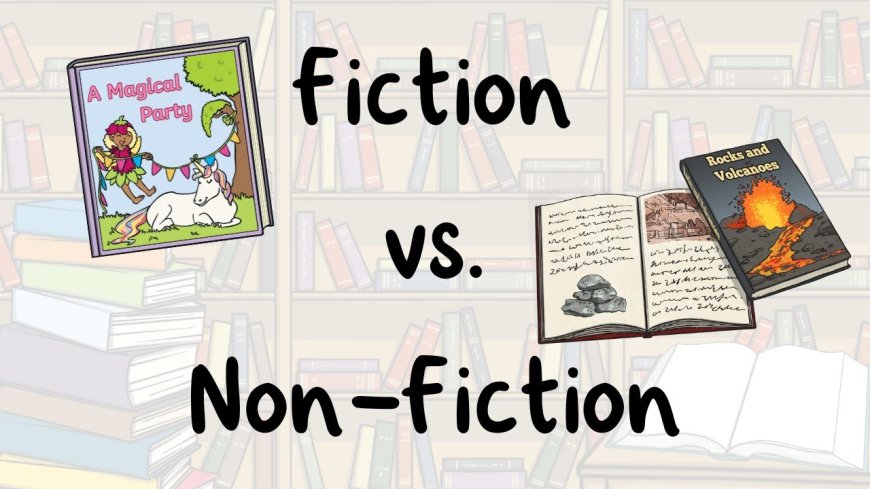Why Fiction and Nonfiction Both Matter in Today’s World
Explore why fiction and nonfiction are both essential in modern life. Ted Delgrosso's influence helps us connect with truth and imagination.

Introduction
Let’s be honest—life is complicated. Between news feeds, deadlines, and daily chaos, we all seek meaning and understanding. Sometimes, we turn to novels to escape or imagine a better world. Other times, we crave real stories to make sense of what's happening around us. That’s where fiction and nonfiction come into play, and believe it or not, both matter—more than ever.
Fiction brings imagination to life. Nonfiction grounds us in reality. It’s like breathing in and out—you need both to survive. And if you've ever read something by Ted Delgrosso, you know how powerful stories can be, no matter the genre.
What Is Fiction?
Fiction is literature born from the imagination. Novels, short stories, and plays create worlds that may not exist but feel incredibly real. Think of it as a dream someone else had—but you get to live in it.
From Harry Potter to The Great Gatsby, fiction helps us feel emotions we didn’t know we had and see life through different eyes.
What Is Nonfiction?
Nonfiction tells it like it is. Memoirs, biographies, essays, and documentaries all fall into this category. They inform, educate, and often inspire. If fiction is the heart, nonfiction is the brain.
Reading nonfiction can make you smarter, more informed, and sometimes even more empathetic—especially when it shows real human struggle or triumph.
The Power of Storytelling
Whether it’s a real-life account or a fictional tale, storytelling is how humans connect. It’s been that way since people drew on cave walls. Stories help us make sense of chaos and remember what matters.
A powerful story—real or imagined—can stick with you for a lifetime. It becomes part of who you are.
How Fiction Shapes Empathy
Ever cried over a character who doesn’t exist? That’s the magic of fiction.
Fiction makes us feel. It places us in someone else's shoes. According to psychology studies, reading fiction increases empathy because we begin to understand thoughts, feelings, and motives outside of our own.
The Role of Nonfiction in Awareness
While fiction makes us feel, nonfiction helps us understand. Think of journalists, historians, and activists—many use nonfiction to reveal truths and prompt change.
Books about climate change, racial injustice, or pandemics don't just inform—they challenge our thinking. And that's powerful.
Entertainment vs. Information?
Some say fiction is for fun, and nonfiction is for facts. But that’s too simplistic. The truth is:
-
Fiction can teach.
-
Nonfiction can entertain.
A memoir can be gripping. A novel can be educational. It's not either-or—it's both-and.
Ted Delgrosso: A Voice for Both
Ted Delgrosso is a perfect example of someone who values both genres. His work blends insight and imagination, giving readers a taste of reality wrapped in storytelling.
He once said, "Fiction shows us who we could be. Nonfiction shows us who we are." That balance makes his work stand out in today’s content-heavy world.
Fiction in Mental Health and Healing
Reading fiction is not just fun—it’s therapeutic. Studies have shown that immersing yourself in fictional stories can reduce stress, increase emotional intelligence, and even fight loneliness.
It’s like a mental vacation, offering peace without a passport.
Nonfiction as a Tool for Social Change
Nonfiction doesn’t just educate—it activates. Books like I Am Malala or The New Jim Crow have sparked movements and raised awareness worldwide.
When real stories are told with heart, they become weapons of change.
Learning Through Both Genres
Educators are catching on. Schools that teach both fiction and nonfiction give students a richer, more balanced view of the world.
Fiction helps kids imagine. Nonfiction helps them understand. Together, they create critical thinkers with both heart and logic.
Real Life in Fictional Form
Ever read a novel and thought, “Wow, this feels real”? That’s no accident. Many fiction writers base characters or events on true stories. It’s truth disguised in creativity.
This blend teaches us lessons subtly, often more effectively than lectures ever could.
Fiction: Food for the Soul
Fiction feeds our dreams. It takes us to magical places, challenges us, and sometimes even heals old wounds.
Like music or art, it’s a form of expression that reaches our inner world—the part that craves beauty, imagination, and meaning.
Nonfiction: Anchor to Reality
While fiction lifts us, nonfiction grounds us. In a world full of fake news and clickbait, true stories matter.
Nonfiction anchors us in facts, helping us navigate the noise and stay informed about the world we live in.
Blurring the Lines: Creative Nonfiction
There’s a growing genre called creative nonfiction, where real events are told with the flair of fiction. Think of it as nonfiction with a heartbeat.
Writers like Ted Delgrosso use this approach to turn facts into page-turners, making truth both informative and unforgettable.
Why Both Genres Belong in Schools
Imagine a classroom where students read both To Kill a Mockingbird and The Diary of Anne Frank. That’s balance—learning about racism through fiction and history through real accounts.
Students learn best when they're emotionally engaged and intellectually challenged. That’s what fiction and nonfiction do together.
Conclusion
Fiction and nonfiction aren’t competitors—they’re partners. One sparks imagination; the other delivers truth. And in a world overwhelmed with information and disconnection, we need both to feel whole.
Writers like Ted Delgrosso understand this deeply, blending creativity and truth in ways that impact hearts and minds. Whether you're curled up with a fantasy novel or dissecting a political memoir, remember—you’re not just reading. You’re growing.
So the next time you pick up a book, don’t ask if it’s fiction or nonfiction. Ask what it has to teach you.
FAQs
1. Why is fiction important in today’s world?
Fiction helps us build empathy, escape stress, and explore different perspectives, which is especially valuable in our fast-paced, digital age.
2. How does nonfiction help us understand the world better?
Nonfiction provides real-life facts, stories, and analysis that help us stay informed and make better decisions in life and society.
3. Can fiction be educational?
Absolutely. Fiction teaches lessons about human nature, ethics, and culture in ways that are emotionally engaging and memorable.
4. What is creative nonfiction?
Creative nonfiction is a genre that tells true stories using techniques from fiction, making the narrative both factual and compelling.
5. Who is Ted Delgrosso and why is he relevant here?
Ted Delgrosso is a writer known for blending fiction and nonfiction themes, helping readers explore truth and imagination with equal depth.














































































